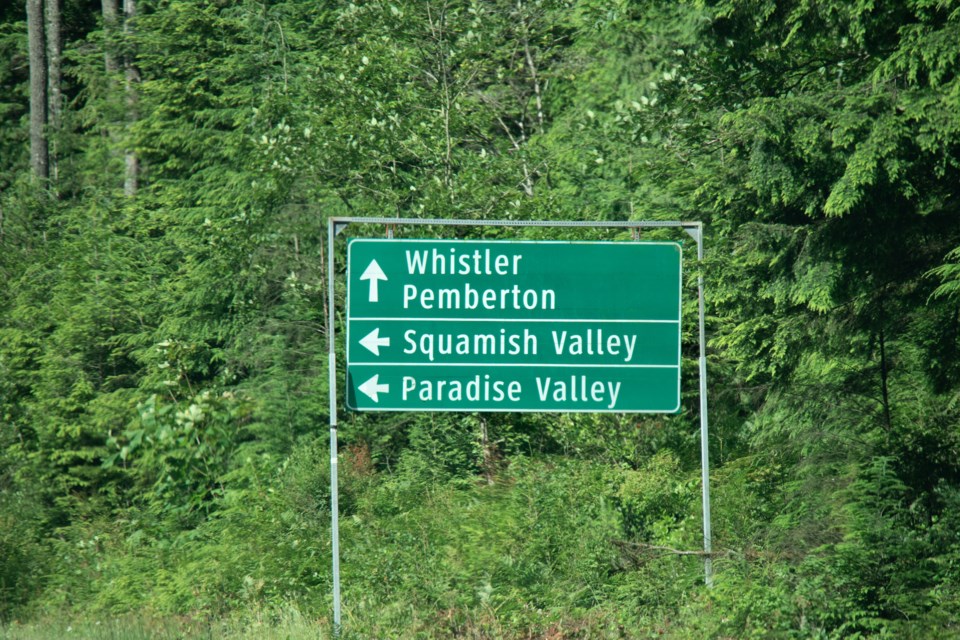The Squamish-Lillooet Regional District (SLRD) is preparing to take a suite of resolutions to the Union of BC Municipalities (UBCM) convention this fall.
Meeting over two days in late June, directors endorsed a wide-ranging list of long-standing priorities, including pushing the province to assume responsibility for infrastructure and enforcement on Crown land, clarify funding and liability for remote fire brigades and support the regional district as they align with Indigenous reconciliation legislation.
“This is stuff that’s been building for years,” SLRD chief administrative officer Heather Paul told the board on June 25.
Orphaned infrastructure in Paradise Valley
Chief among the SLRD’s frustrations is the maintenance of “orphaned” roads and bridges—assets no longer claimed by any provincial ministry or agency but still heavily used by locals, visitors and commercial operators.
Paradise Valley Road and the Jack Webster Bridge in Squamish were held up as examples.
“It’s kind of been orphaned. No one’s taken responsibility for it, so the SLRD has assumed control,” said Paul. “The SLRD currently draws $15,000 a year from those homeowners to maintain minimal maintenance and that’s not really meeting all the needs.”
Paul noted residents in the area are already heavily taxed based on assessed property values—assessments often tied to road and water access.
“To draw more taxes from these residents is unfair,” she said. “You could argue assessed value is based on having proper road access and water access,” which SLRD staff feel these communities currently lack.
The issue isn’t just fairness, but safety; the area is also at risk of flooding. And while the Ministry of Forests and BC Hydro both claim no interest in the bridge or road, Paul pointed out “a lot of commercial space and recreational people are using that bridge… so it’s not just the residents who feel the need.”
Fire brigades in legal limbo
Another top concern is the precarious legal status of small rural fire brigades in unincorporated communities—many of which operate without stable funding or liability protection under current provincial frameworks.
In the Upper Squamish Valley, Area D Director Tony Rainbow noted one volunteer fire department had proved effective despite having no legal standing. He said it would be nice to have a mechanism by which those sorts of small, volunteer groups could become compliant.
Vivian Birch-Jones, director for Electoral Area B, said several fire departments in her area have effectively been abandoned by the province. She noted those brigades serve an increasingly important purpose.
“To do nothing is not really a practical option in some of those areas where there really is nothing else,” she said. “These resources are just going to get stretched thinner and thinner in the climate change situation that we’re facing.”
Crown land campers
The SLRD is also seeking stronger provincial enforcement against long-term camping on Crown land, particularly in the Squamish Valley. .
“There’s no [way] for the SLRD to enforce this because it’s public land,” said Paul. “Right now, there’s safety, fire and waste-hazard concerns. A lot of people are living there full-time.”
District of Squamish Mayor Armand Hurford supported the call, noting the need to pair enforcement with more legal camping options.
“Squamish has been advocating for an expansion of camping—legitimate camping—opportunities in and around the district,” he told the board.
Provincial responsibility on climate
SLRD directors repeatedly emphasized that rural and mountainous communities like theirs are already grappling with the front lines of climate change. Several called on the province to step up and fund the local response to climate emergencies.
“What we’re hearing is that the SLRD is the canary in the coal mine when it comes to climate change and emergency response,” said Paul. Because the SLRD has one of the most diverse arrays of biomes, the impacts of climate change can be felt in multiple fashions—from drought to wildfires to flooding to landslides.
Squamish Director Chris Pettingill criticized the province’s hands-off approach to emergency preparedness on Crown land.
“There’s expense after expense after expense… stuff that [the province is] not taking care of, all to do with climate change,” he said. “I’m not seeing an accounting of how this works or a plan that puts these pieces together. I’m not seeing [the province] stepping up on this piece.”
Funding for reconciliation
The SLRD also wants more support to implement B.C.’s Declaration on the Rights of Indigenous Peoples Act (DRIPA), including capacity funding for First Nations engagement and updating internal policies.
Paul noted the province has launched a pilot study group exploring models for Indigenous-inclusive regional governance beyond treaty-based relationships.
“There’s an opportunity to extend that now to those regional districts who are ready for it,” she said.
Other resolutions
Other topics on the SLRD’s UBCM agenda include:
- A call for the Conservation Officer Service to invest in public education and communication on bear awareness, rather than leaving outreach to local governments and non-profits;
- A request for the province to increase maintenance funding to address growing use and deteriorating conditions on the Hurley Forest Service Road;
- Support for a resolution from Lillooet, via the Southern Interior Local Government Association, addressing the “incredible cost” of archeological studies required for development under heritage legislation.
While SLRD directors acknowledged not every resolution would result in a meeting, board chair Jen Ford urged persistence.
“We’re likely not going to get all of them. We likely might not get half of them. But it’s better to ask and then not get it, than it is to not ask,” she said.
The 2025 UBCM will be held in Victoria from Sept. 22 to 26.



